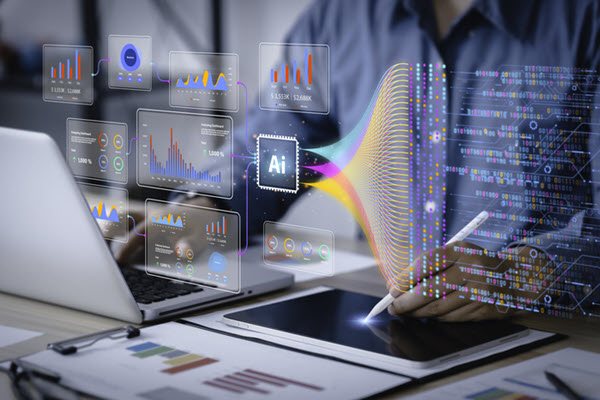Generative AI (Gen AI) transforms how organizations interact with data and develop high-quality software. GenAI is a game changer in multiple industries, automating processes, increasing accuracy, and providing predictive insights. Here, we concentrate on its uses in data management, effects on efficiency, innovation, and cost savings.
GenAI in Data Management
Gen AI revolutionizes the data lifecycle by improving data quality, automating processes, and thus accelerating and improving decision-making. Key applications include:
- Data Augmentation: Gen AI generates synthetic data to augment existing datasets. This is more advantageous when training machine learning models that require diverse and large-scale data inputs.
- Data Cleansing finds and corrects duplicates, errors, missing values, and inconsistent formats, providing high-quality datasets ready for analysis.
- Data Enrichment: Gen AI generates fresh features for existing data (e.g., generating customer demographics based on purchase history or activity logs).
- Real-time Data Processing: Gen AI uses complex algorithms for real-time ingestion, cleansing, and transformations, guaranteeing seamless integration across systems.
- Predictive Analytics observes patterns and anomalies in data to forecast trends or spot a critical problem before it escalates.
Benefits of Data Management
- Accuracy and consistency of datasets are improved
- Operational costs and manual intervention are reduced.
- Improved innovation with high-quality data for better product development.
GenAI in Quality Assurance (QA)
GenAI is also transforming QA processes by automating test cases, generating test data, detecting bugs at an early stage, and performing predictive analysis. Its dynamic capabilities enhance the efficiency of software testing and reduce costs.
Applications in QA
Synthetic Test Data Generation: GenAI synthesizes realistic datasets critical for unbiased testing, assisting organizations with the ethical concerns of real-world data. It is especially relevant for healthcare.
Automated Test Case Generation: GenAI examines user stories and requirements using retrieval-augmented generation (RAG) and advanced algorithms to automatically create comprehensive test cases.
Exploration of Scenarios: QA teams can validate rare case scenarios that are difficult to find manually. GenAI is generating complexities that truly reflect realistic usages.
Continuous Monitoring: Unlike traditional AI approaches, GenAI monitors software performance in real-time even as development cycles run.
Test Automation: Generative AI enables tools like GitHub Copilot and AWS Code Whisperer to generate reusable code snippets to deploy automated tests, reducing manual work.
Benefits in QA
- Better, wider coverage of the test scenario and device.
- Predictive insights to identify defects faster.
- Saves Cost due to reduction of manual testing efforts.
Generative AI implementation challenges
As the advantages are considerable, there are some challenges to Gen AI implementation:
Integration Challenges: It may be challenging to ensure Compatibility with existing systems.
Data Sovereignty: Following regulations on how to handle sensitive or synthetic data e.g. GDPR compliance.
Resistant to Change: Individual teams might be unwilling to adjust to new tools because they either lack knowledge of how to utilize them or fear being displaced, not just by the tools themselves but also, in a wider sense, by automation.
Firm plans, stakeholder engagement, and clear guidance on AI tool use will help to ameliorate these challenges.
Conclusion
Generative AI is used to revolutionize data management and QA processes. Automating tasks to improve performance and accuracy for reducing errors and predictive analytics via synthetic data creation is a way to distinguish oneself as the foundation of certain emerging digital transformation strategies today. The more businesses collaborate with GenAI throughout their workflows, the more its capabilities will reveal efficiency and innovation, at blazing speed.


This article helped me clear up a few doubts I had. Appreciate the clarity.
This is a fascinating exploration of how Generative AI is revolutionizing data and QA processes! The ability to automatically generate test cases, create synthetic data, and predict potential failure points represents a monumental shift in quality assurance. This technology not only accelerates development cycles but also enhances test coverage and accuracy. A truly transformative approach that’s reshaping the future of software reliability and data integrity.